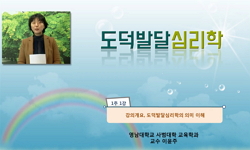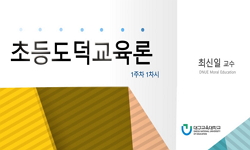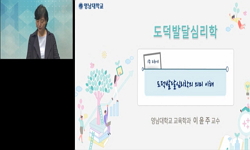Taking over and developing Korean traditional culture inheritances and achieving something great in the field of educational thought, Dasan had tried to research the Confucian Classics and interpreted newly their original thought in the position of Sh...
http://chineseinput.net/에서 pinyin(병음)방식으로 중국어를 변환할 수 있습니다.
변환된 중국어를 복사하여 사용하시면 됩니다.
- 中文 을 입력하시려면 zhongwen을 입력하시고 space를누르시면됩니다.
- 北京 을 입력하시려면 beijing을 입력하시고 space를 누르시면 됩니다.
https://www.riss.kr/link?id=T11955521
- 저자
-
발행사항
청원 : 韓國敎員大學校 大學院, 1990
-
학위논문사항
학위논문(석사) -- 韓國敎員大學校 大學院 , 國民倫理敎育專攻 , 1990. 2
-
발행연도
1990
-
작성언어
한국어
- 주제어
-
DDC
170.7
-
발행국(도시)
충청북도
-
형태사항
iv, 57 p. ; 26cm
- 소장기관
-
0
상세조회 -
0
다운로드
부가정보
다국어 초록 (Multilingual Abstract)
Taking over and developing Korean traditional culture inheritances and achieving something great in the field of educational thought, Dasan had tried to research the Confucian Classics and interpreted newly their original thought in the position of Shil-Hak (Korean Practical Science, 實學). The author would like to study in this thesis Dasan's point of view on morality through his own interpretation on the Four Confucian Classics, define his theory on the moral educational thought and study to find out some helpful aspects which could influence the current thought on moral education.
First, Ch'□n (Heaven, 天) is the almighty creator and supervisor as the origin of morality. And it can rule human being through its own will, which is a kind of command transmited to human being.
Its command is perceived through our own Do-Shim (moral mind, 道心). We could come nearer to the perfect condition of morality when we would try to obey its will.
Second, Dasan has argued human real nature would be equivalent to preference : preference would be composed of physical and moral preference. Moral preference leading us to good belongs to only human being and we could be the moral being who can distinguish good from evil.
And lastly, mankind should live with others. Perfect virtue( 仁 ) means two persons( 人+人), which appears our duty to be done in human relationships. Dasan said that perfect virtue could be gained as the result of our behavior in real lives, not the gifted mental condition.
The study on Dasan's thoughts of moral education is as follows:
First, the standard of the humanly act bases on moderation. Moderation might be changed according to the objects and the situations. And it is achieved by Sh□( 恕 ), that is, one's attitude of understanding others by putting himself in another's places.
Second, Dasan's moral principle means the sutable relationship in the various human joint. He thought the various manners According to the moral principles important.
Lastly, Dasan showed us Hyo(Filial piety, 孝 )·Che(Brotherly love, 弟 )·Cha (Benevolence, 慈 ) as the contents of moral education. They were taught and used as the moral principle between only the members of family at home until his days but he had studyed to expand the concept of them as the canon of society. Therefore he said the leader who would be the perfect man with being moral educated well could realize Hyo, Che, Cha. And he had expected the moral teacher should own the idealistic character originated from the perfect leader's personality.
The author thinks Dasan's viewpoint of morality based on the dignity of man could influence the current society which is unstable in the of crisis morality. Manly life should go with ones' moral activities. I can say that the moral activity could be perfect by the fit human relationalships. As the result, moral education could be the bitality and show us the right direction for social change when it would be practised in order to cause the right human relationships.
목차 (Table of Contents)
- 1 서론 = 1
- 2 경학사상에 나타난 다산의 도덕관 = 5
- 2.1 도덕의 근원으로서의 天命 = 6
- 2.1.1 天사상의 개념적 변천 = 6
- 2.1.2 다산의 天·上諦觀 = 9
- 1 서론 = 1
- 2 경학사상에 나타난 다산의 도덕관 = 5
- 2.1 도덕의 근원으로서의 天命 = 6
- 2.1.1 天사상의 개념적 변천 = 6
- 2.1.2 다산의 天·上諦觀 = 9
- 2.1.3 天과 인간의 관계 = 12
- 2.2 도덕적 존재로서의 인간이해 = 15
- 2.2.1 嗜好로서의 人性 = 15
- 2.2.2 욕구와 도덕 = 17
- 2.2.3 자율적 인간 = 19
- 2.3 도덕적 규범 = 23
- 2.3.1 仁의 의미 = 23
- 2.3.2 德의 의미 = 26
- 3 다산 도덕교육사상의 이론적 구조 = 28
- 3.1 도덕적 실천의 방법 = 30
- 3.1.1 행위기준으로서 中庸 = 30
- 3.1.2 실천방법으로서의 恕 = 33
- 3.2 도덕사상의 근거 = 36
- 3.2.1 도덕원리 = 36
- 3.2.2 도덕과 습관 = 38
- 3.3 다산 도덕교육의 이론 = 40
- 3.3.1 도덕교육의 내용 = 40
- 3.3.2 도덕적 실천자 = 42
- 3.3.3 도덕교육과 교화 = 43
- 3.3.4 도덕교육자료 = 45
- 3.3.5 도덕교사 = 46
- 4 결론 = 48
- 참고문헌 = 50
- ABSTRACT = 55












